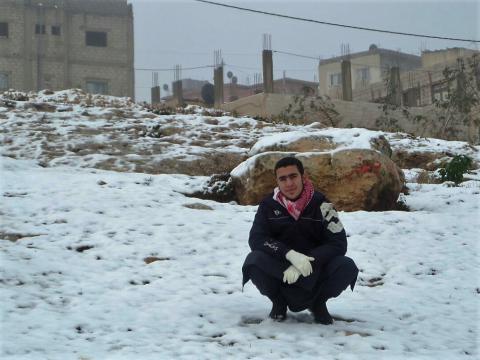Jordan: UN calls for release of arbitrarily detained high school student while reiterating demand for abolition of State Security Court

The UN Working Group on Arbitrary Detention (WGAD) has issued an Opinion calling for the immediate release of 20-year-old Hatem Al Darawsheh, who is currently detained in a maximum-security prison following an unfair trial before Jordan’s State Security Court (SSC).
In Opinion No. 46/2017, UN experts labelled Al Darawsheh’s detention as “arbitrary,” citing numerous violations of both the Universal Declaration of Human Rights (UDHR) and the International Covenant on Civil and Political Rights (ICCPR), the latter of which Jordan has been party to since 1975.
Imprisoned on the basis of confessions extracted under torture
Al Darawsheh, a high school student at the time, was at home on January 19, 2016 when members of the General Intelligence Directorate (GID) broke in and arrested him without any warrant. Two days later, while appearing before the Public Prosecutor of the State Security Court, a military judge sitting at the premises of the GID, Al Darawsheh denied the accusation of “being a supporter of the Islamic State (IS).”
Throughout an entire month of detention, Al Darawsheh was held incommunicado. He was denied all access to the outside world including his family and lawyer. When his relatives were finally allowed to visit him, they found that he had been severely tortured by GID officers.
Al Darawsheh told his family that he was severely beaten, banged against the wall, and interrogated until he would answer the questions in the way in which his interrogators wanted. He was also forced to sign a document containing his “confession.”
Al Darawsheh was held at the GID premises in Amman until March 10, 2016, when he was transferred to the maximum security prison of Muwaqqar II, where he remains detained up until today.
On December 5, 2016, the SSC sentenced Al Darawsheh to three years of imprisonment under Jordan’s infamous 2006 Anti-Terrorism Law. He was charged with “promoting a terrorist organisation” for allegedly supporting IS, on the sole basis of the self-incriminating statement extracted under torture.
Concerned over the abuses present in Al Darawsheh’s case, Alkarama raised the case with the WGAD, asking that they urgently intervene with the Jordanian authorities to request Al Darawsheh’s release and to drop all charges held against him.
UN highlights violations to international human rights treaties
In its Opinion No. 46/2017, the WGAD cited multiple violations of the ICCPR and UDHR with regards to Al Darawsheh’s arrest, trial, and detention. One such example is the Jordanian authorities’ denial of Al Darawsheh’s right to habeas corpus.
The arresting officers did not inform Al Darawsheh of the reasons behind his arrest, and when he was brought before the Public Prosecutor of the State Security Court two days after the arrest, he was not permitted to challenge the legality of his detention.
Al Darawsheh’s right to habeas corpus was further denied during the period of incommunicado detention when he was placed outside the protection of the law. The WGAD thus found that “there was no legal basis invoked to justify the arrest and detention of Mr. Al Darawsheh.”
The experts also highlighted “the failure by the investigative judge to open an investigation into his allegations of torture, despite the testimony provided by other inmates.” Al Darawsheh’s confession extracted under torture during his incommunicado detention was used as the sole evidence to indict him with “promoting a terrorist organisation.”
In terms of the trial itself, the WGAD found that Al Darawsheh’s trial before the SSC did not meet international fair trial standards as the court cannot be considered a competent, independent and impartial tribunal.
The SSC is composed of two military judges and one civilian judge, and the court’s General Prosecutor has the rank of a military officer. The WGAD recalled that the trial of a civilian before a military or quasi-military court was not consistent with the international standards on the right to fair trial with due guarantees. The UN experts also noted that the SSC is “very closely associated with the Government of Jordan.”
As the State Security Court remains very closely associated with the Government, the WGAD reiterated its call to abolish this special court, and referred the issue the Special Rapporteur on the independence of judges and lawyers for further consideration.
What will happen next?
The Working Group called upon the Jordanian Government to take the necessary measures to remedy Hatem’s situation “without delay,” considering that “the appropriate remedy would be to release Mr. Al Darawsheh immediately.”
Jordan was also encouraged to “ensure a full and independent investigation of the circumstances surrounding the arbitrary deprivation of liberty of Mr. Al Darawsheh, including an independent inquiry into his allegations of torture, and to take appropriate measures against those responsible for the violation of his rights.”
The Jordanian authorities are obliged to inform the WGAD of the measures taken to implement these recommendations within six months. Considering the gravity of matter, the Special Rapporteur on torture and other cruel, inhuman or degrading treatment or punishment (SRT) was also informed of the allegations of torture raised by the victim and relayed by Alkarama.
For more information or an interview, please contact the media team at media@alkarama.org (Dir: +41 22 734 1008).
